Конспект уроку з англійської мови на тему: "The unusual house" 5 клас НУШ
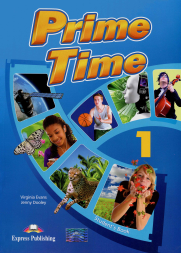 Topic: The unusual house
Topic: The unusual house
Aims:
Практична: активізувати лексику теми, навчити учнів правильно використовувати граматичні конструкції, тренувати учнів у вживанні структури There is / There are (some/any); удосконалювати уміння утворювати питальні та заперечні речення зі стверджувальних.
Освітня: забезпечити засвоєння, поглиблення, узагальнення та закріплення основних лексичних знань учнів з даної теми, формувати вміння і навички монологічного мовлення, спонтанного висловлювання, використання здобутих знань на практиці
Розвиваюча: розвивати здатність самостійно робити висновки з теми, систематизувати, встановлювати зв`язки раніше вивченого з новим; розвивати логічне мислення, увагу, їхній творчий потенціал
Виховна: формувати такі якості особистості як відповідальність, організованість, дисциплінованість, виховувати всебічно розвинену особистість через отримання інформації
- to practice the active vocabulary of the topic;
- to develop speaking, reading, listening and writing skills through various activities;
- to develop logical thinking, memory, imagination, pupils’ mental outlook
- -to develop respect to own houses , tidiness and cultural traditions.
Vocabulary: door, window, wardrobe, stairs, mirror, floor, garden, cupboard.
Structures: There is/are… (Some/any)
By the end of the lesson pupils will be able
to use the words from the topic;
to describe the rooms in the picture
to ask and answer the questions (There is/There are);
to work in pairs, groups
Equipment: student’s book, workbook, a laptop, audio and video recordings, pictures, cards for working in pairs and teams.
Procedure
- Preparation for apprehension foreign speech
Greeting (1 min.)
- Good morning boys and girls! Nice to meet you.
- I want to ask you to be attentive and active. Don’t be afraid, don’t be silent. Speak and express your opinion. OK, look at each other, please. Smile! Look at me. Smile! So, let’s start our communication.
- Aim and motivation: (3 min.)
- Well, today we continue the conversation about the houses and the description of the rooms. But today we will not talk about usual houses, but about special ones.
- Look at the pictures and tell: Why are these houses unusual? (pictures)
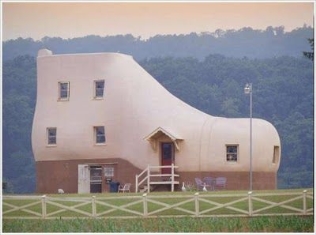
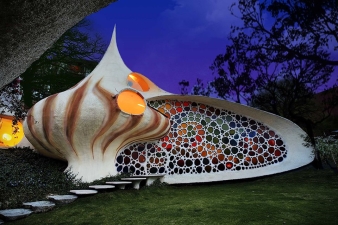
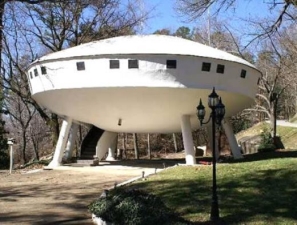
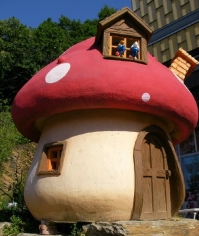

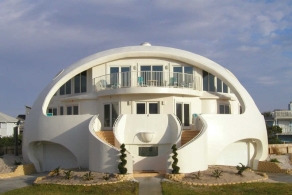
- These houses are in the different shapes. (the shapes of a shoe, a mushroom, a ball, a spaceship and even the shape of a seashell)
- At the end of our lesson, I hope you will make your own imaginary unusual house.
III. Phonetic drills (3 min.)
-
First of all, let’s remember the names of the rooms and furniture we have in our houses and flats and practice your pronunciation. Listen some words and repeat after me. Then find out the common sound.
[a:] – carpet, bath, bathroom
[i] – sink, living room, mirror, television
[w] – wardrobe, washbasin, window, wall
[e] – bedroom, step, central
[ou] – home, poster
[ ]– kitchen, chair, armchair
]– kitchen, chair, armchair
[d] – desk, dining room, dressing table - Checking the homework (7 min.)
https://www.gamestolearnenglish.com/vocab-game/#task/fedoskinanimets@gmail.com/hometask1
Game "Secret Letters". (Повторення вивчених ЛО з теми)
- And now I propose to you a written task, which is called the "Secret Letters".
- Some of you have the cards. Please, take your pens or pencils and fill in the missing letters into the words. You have only two minutes.
|
Living room |
Bathroom |
Bedroom |
|
bo..kc..s.. |
mir..o.. |
pi..l..w l..m.. |
Game «Spelling Bee".
- Other, we are going to play the game “Spelling Bee”
https://www.gamestolearnenglish.com/spelling-bee/#user/fg/110/fedoskinanimets/house
IV . The Main Part of the Lesson
- Vocabulary Revision (3 min.)
- Listen to the sentences. I’ll describe different rooms and you should guess them.
Examples:
- This room is not very large. People take off their coats, hats, boots or shoes there. There is usually a mirror there. ( a hall).
- This room is not very large. We take a shower or have a bath in this room. You can clean your teeth, wash your hands and face there. (a bathroom).
- There are beds in this room. You can see a little table and a wardrobe there. People have a rest in this room. (a bedroom).
- There is a TV, some chairs and a sofa in this room. Some people have a fireplace there. We can see some flowers. There is often carpet on the floor. It is usually the largest room in the house. People watch television, listen to music. (a living room).
- Our mothers usually spend a lot of time there. We have a fridge, a sink, a table, a cupboard in this room. (a kitchen).
- People have breakfast, lunch, and dinner or drink tea in this room. There is a big table and some chairs there. (dining room)
1-b) – a hall
2-g) – a bathroom
3-c) – a bedroom
4-a) – a living room
5-f) – a kitchen
6-d) – a dining room
- Presentation and practice vocabulary for furniture (4 min.)
- Look at the pictures and the numbered items on p.26. These pictures show the inside of the house on p.27. (the house is in the shape of a seashell)
-
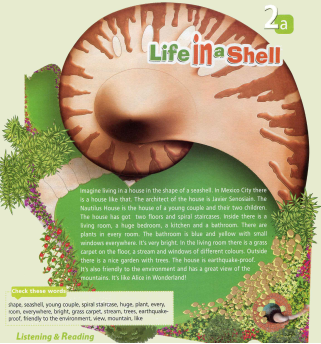
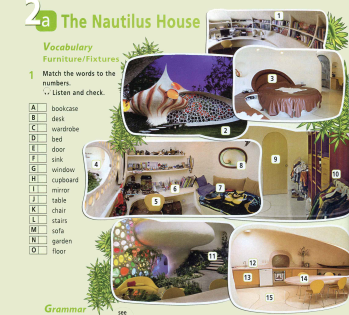
Let’s do Ex.1 p.26. Match the words to the numbers. You have only three minutes. (Check answers)
- Physical exercises (game “Simon says”) (1 min.)
-
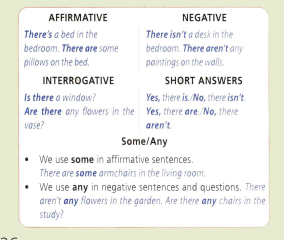 Grammar. (There is / There are) (8 min.)
Grammar. (There is / There are) (8 min.)
- And now, let’s learn There is/There are. Look at the table on p.26
We use there is (there’s)/there are to say that someone or something exists.
We use there is when we are listing individual things. Look at the screen.( video)
 https://www.youtube.com/watch?v=gYyfun8e2eQ
https://www.youtube.com/watch?v=gYyfun8e2eQ
- Let’s do Ex.2b p.26. Look at the pictures and fill in: is, are, isn’t or aren’t. You have two minutes. (Check answers)
- Writing (Work in groups) (8 min.)
- Look at the screen. You can see 4 different shapes: a triangle, a circle, a square and a rectangle. Choose one of them.
- Who has chosen the triangle? Sit all together. You will work in a team. Etc
- Each team has got the cards with one of the different rooms: a bedroom, a living room, a kitchen and a dining room. You task complete 5 questions (Is there…/Are there…?)
- After that you short change your cards with another group and answer these questions.
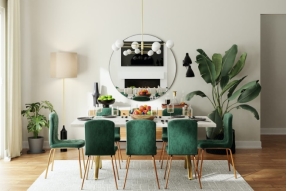
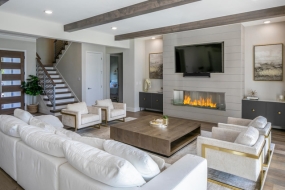
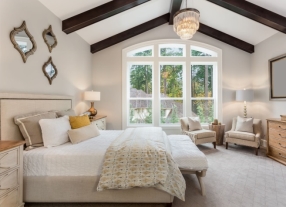
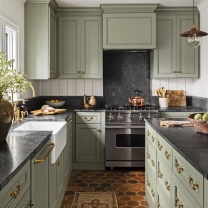
-
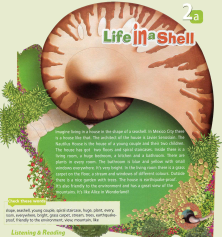 Listening (5 min.)
Listening (5 min.)
1) - Look at the title and the picture on p.27(“Life in a shell”)
- What is the text about? (The text is about an unusual house that is in the shape of a seashell)
- Before listening, look at the Check these words box. Let’s we explain the meanings of the words and translate them. (Check these words)
-
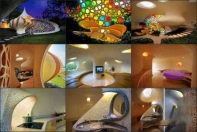 Listen and follow the text in your books. (play the recording)
Listen and follow the text in your books. (play the recording)
- What do you think it is like living in this house? (I think it is fun living in this house).
-
 - Listen again and mark the sentences T (true), F (false) or DS (doesn’t say) in Ex. 4b p.27 (Check answers).
- Listen again and mark the sentences T (true), F (false) or DS (doesn’t say) in Ex. 4b p.27 (Check answers).
- Speaking (2 min.) (extra exercise)
- Do you like this house?
- Give two reasons why you could live in it.
- Homework.
- Imagine your own unusual house. Complete few sentences to describe it. Write about: numbers of rooms, what there is inside the house, garden. etc.
Summing up
-
Finish the sentences:
- At the lesson I learnt …
- I liked …
- I didn’t like …
- Thank you for you working. All of you are really good today and you will get good marks. Our lesson is over, good bye. And remember: “East or West home is best”. Good luck, students.


про публікацію авторської розробки
Додати розробку
